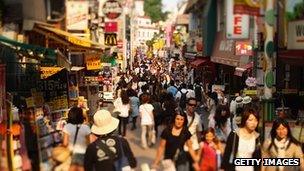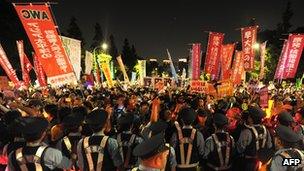Tokyo firms and households face higher electricity costs
- Published

Thousands of small businesses and households will see their electricity costs rise
In downtown Tokyo, almost every neighbourhood has bustling shopping streets that are full of friendly small corner shops.
Tamiichi Ohashi and his family run one such shop selling tofu in Chitose Funabashi.
Come 1 September, their store will have to pay more for electricity which is crucial to make all kinds of tofu that are popular among local residents.
"It'll be painful because we cannot pass on the higher costs to our customers," says Mr Ohashi.
"Most small businesses are barely making ends meet, and for us, we've already been hit by higher prices of soy beans."
The approved hike, external of 8.46% is lower than what Tokyo Electric Power Company (Tepco) originally suggested, but the majority of the public are still not happy.
"It's not just about the money," says 74-year-old Tokyo resident Haruko Nakaiwa, who has been protesting against the rise.
"I just don't trust that Tokyo Electric has done everything it can before asking us to share the burden."
'Blackmailing us'
Ms Nakaiwa is the vice-president of the Japan Federation of Women's Organizations which, along with other citizens' groups, held a meeting with Tepco about the proposed hike before it was approved.
"They said some of the money would be spent on restarting nuclear reactors which is exactly the opposite of what we have been demanding," she says.
Since late March, there have been weekly demonstrations outside the prime minister's residence where hundreds of thousands of people have gathered to voice their anger at the government's decision to restart two nuclear reactors at the Ohi power plant in western Japan.
"Tepco told us they would need to raise electricity prices even higher, by 15%, if they were to decommission all the nuclear power plants," says Ms Nakaiwa.
"It felt like they were blackmailing us to continue using nuclear power.
"Any other company would have to sell all the assets to cover the costs but Tepco just gets bailed out by our money," she adds.
The government practically nationalised the utility giant on 31 July by injecting 1 trillion yen ($12.7bn; £8bn) of taxpayers' money.
For its part, Tepco has repeatedly apologised "for the heavy burden" that its customers must share.
Electricity conservation
With the government's approval of the hike, prices are going up whether or not customers like it. Almost 90% of housewives surveyed by Neo Marketing expect them to rise even further.
As a result, electricity conservation has become the daily norm.

Despite rising electricity prices many in Japan are against the restart of nuclear reactors
Yoko Hanawa is a financial adviser who has become an expert on how to save electricity and protect one's household budget.
"There are four items that make up almost 70% of our electricity usage," she says.
"Air conditioners account for a quarter and the other items are refrigerators, lightings and televisions."
She says she has applied insulation film on her windows to block the direct sunlight from warming up the rooms.
"We then leave only one air conditioner on all day at 28 degrees because changing the temperature or switching it on and off uses more electricity," she adds.
She also advises reducing the amount of food and drink you put in a fridge and lowering the brightness of TV screens.
"If you manage to keep the electricity usage to 300 kilowatt hours each month, Tepco's price hike wouldn't affect you too much," she explains.
Tertiary benefits?
Using different types of light bulb can also help reduce energy usage and makers of light emitting diodes (LEDs) have seen demand surge.
In 2011, the LED market more than doubled to 221bn yen, according to market research firm Fuji Keizai Group. It is expected to grow to 373bn yen this year.
LED light bulbs are more expensive but last much longer than filament or fluorescent bulbs and therefore are considered more energy efficient.
Other items such as electric fans and bamboo blinds also saw their sales double in 2011, according to the Japan External Trade Organization, with most products being imported from China.
Thanks to these efforts, the average amount of electricity that was used in Tokyo last summer was much lower compared with 2010.
According to the data compiled by the Kanto Bureau of Economy, Trade and Industry, people have been saving as much electricity this year as in 2011.
Last year, the attitude of jishuku - voluntary self-restraint - was evident as the Japanese people tried to share the burden of the tragic natural disasters that hit the county by refraining from enjoying themselves.
The usually brightly lit Tokyo was dim. While most lights are turned back on this year, people's collective attitude to save electricity still prevails.
"We don't mind conserving energy or even paying more for it," says Ms Nakaiwa of the Japan Federation of Women's Organizations.
"We just want clear explanations on why we are paying this much more and I really hope our money isn't used to restart nuclear reactors."
- Published1 August 2012
- Published27 June 2012
- Published17 January 2012